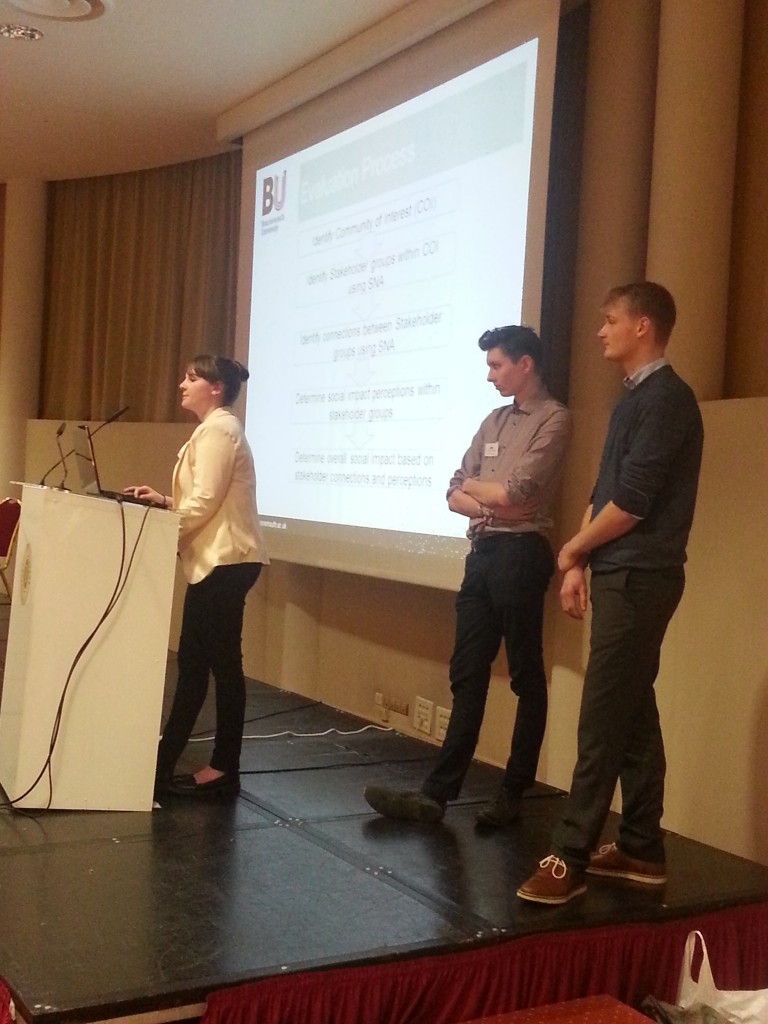
 Following the internal launch at BU on the 14th February 2014, BU Researchers at the Centre for Intellectual Property Policy and Management (CIPPM) launched the Copyrightuser.org at The Arts and Humanities Research Council (AHRC) Creative Economy Showcase.
Following the internal launch at BU on the 14th February 2014, BU Researchers at the Centre for Intellectual Property Policy and Management (CIPPM) launched the Copyrightuser.org at The Arts and Humanities Research Council (AHRC) Creative Economy Showcase.
The event was held at Kings Place, London, on Wednesday 12th March 2014. The Showcase demonstrated the outputs and innovations of AHRC investments in the Creative Economy through presentations, workshops and exhibitions. The sectors exhibited on the day, included fashion, design, video games, architecture, broadcasting, archives, digital technologies and dance.
Amongst the various funded initiatives showcased on the day, Copyrightuser.org held a prominent exhibition stand and exhibited the website which was complemented by large posters, bookmarks and myth/reality cards (illustrated below) which explained the most common myths about copyright.
This high-profile event was attended by over 450 delegates and included policy-makers, business leaders in the creative industries, knowledge exchange practitioners, directors of research in universities, senior representatives from partner organisations in the Creative Economy, other strategic funding agencies in the sector, representatives from the AHRC’s investments in the Creative Economy and other stakeholders.
Keynote speakers included amongst others Sebastian Conran (Designer), the Hon David Willetts (Minister of State for Universities and Science), Ed Vaizey MP (Minister for Culture, Communications and Creative Industries) and Professor Rick Rylance (CEO, AHRC).
Highlights from the day can be streamed here.
Copyrightuser.org was funded by the BU Fusion Investment Fund in 2012 and was developed by the Business School’s Centre for Intellectual Property Policy and Management (CIPPM) in collaboration with Centre for Excellence in Media Practice (CEMP). Following the success of the Fusion Funded project, the CIPPM-led team went on to secure RCUK funding provided by CREATe in August 2013 to extend the scope of the project. Phase II of the copyrightuser.org is now underway.
The launched online resource aims to make UK copyright law accessible to creators and members of the public. This 1-minute video captures the concept behind the Copyrightuser.org project.
Using quantitative and qualitative methods the site aims to provide answers to the most pressing concerns that creators and the public have about copyright law. To achieve these aims, interviews with creators where conducted and a video for each creative sector was produced demonstrating their thoughts and questions about copyright, see the musicians video here for example. Secondly, 200 frequently asked questions posted by users online were sourced, analysed and coded down to the 20 most common.
The Copyrightuser.org has so far been received very well as evidenced by the positive feedback from various organisations, individuals, legal professionals and the creative industries.
During the launch, the website received 232 visits; and has now received over 1,558 visits to date.
Please also visit our twitter page – @copyrightuser to keep up with the Copyrightuser.org developments.
The copyrightuser.org team consists of:
Dr. Dinusha Mendis (Principal Investigator & Co-Director CIPPM)
Mr. Bartolomeo Meletti (Lead Multimedia Producer and CIPPM Research Assistant)
Ms. Hayleigh Bosher (PhD Candidate (Copyright) and CIPPM Research Assistant)
Professor Martin Kretschmer (Principal Investigator & Director CREATe)
Dr. Kris Erickson (Co-Investigator, CREATe).
The team is further assisted by a Production Team consisting of Marco Bagni (Art Direction, Design and Animation), Sar:co (Music and SoundFX), Davide Bonazzi (Illustrations) amongst others and an Editorial Board consisting of Professor Maurizio Borghi (Director, CIPPM); Professor Ruth Towse (Co-Director, CIPPM); and Professor Ronan Deazley (Professor of Copyright Law, University of Glasgow) amongst others.
































 Fourth INRC Symposium: From Clinical Applications to Neuro-Inspired Computation
Fourth INRC Symposium: From Clinical Applications to Neuro-Inspired Computation Writing policy briefs
Writing policy briefs Upholding Excellence: The Concordat to Support Research Integrity
Upholding Excellence: The Concordat to Support Research Integrity Today’s Documentation Will Serve Tomorrow’s Justice
Today’s Documentation Will Serve Tomorrow’s Justice ECR Funding Open Call: Research Culture & Community Grant – Application Deadline Friday 12 December
ECR Funding Open Call: Research Culture & Community Grant – Application Deadline Friday 12 December MSCA Postdoctoral Fellowships 2025 Call
MSCA Postdoctoral Fellowships 2025 Call ERC Advanced Grant 2025 Webinar
ERC Advanced Grant 2025 Webinar Horizon Europe Work Programme 2025 Published
Horizon Europe Work Programme 2025 Published Horizon Europe 2025 Work Programme pre-Published
Horizon Europe 2025 Work Programme pre-Published Update on UKRO services
Update on UKRO services European research project exploring use of ‘virtual twins’ to better manage metabolic associated fatty liver disease
European research project exploring use of ‘virtual twins’ to better manage metabolic associated fatty liver disease